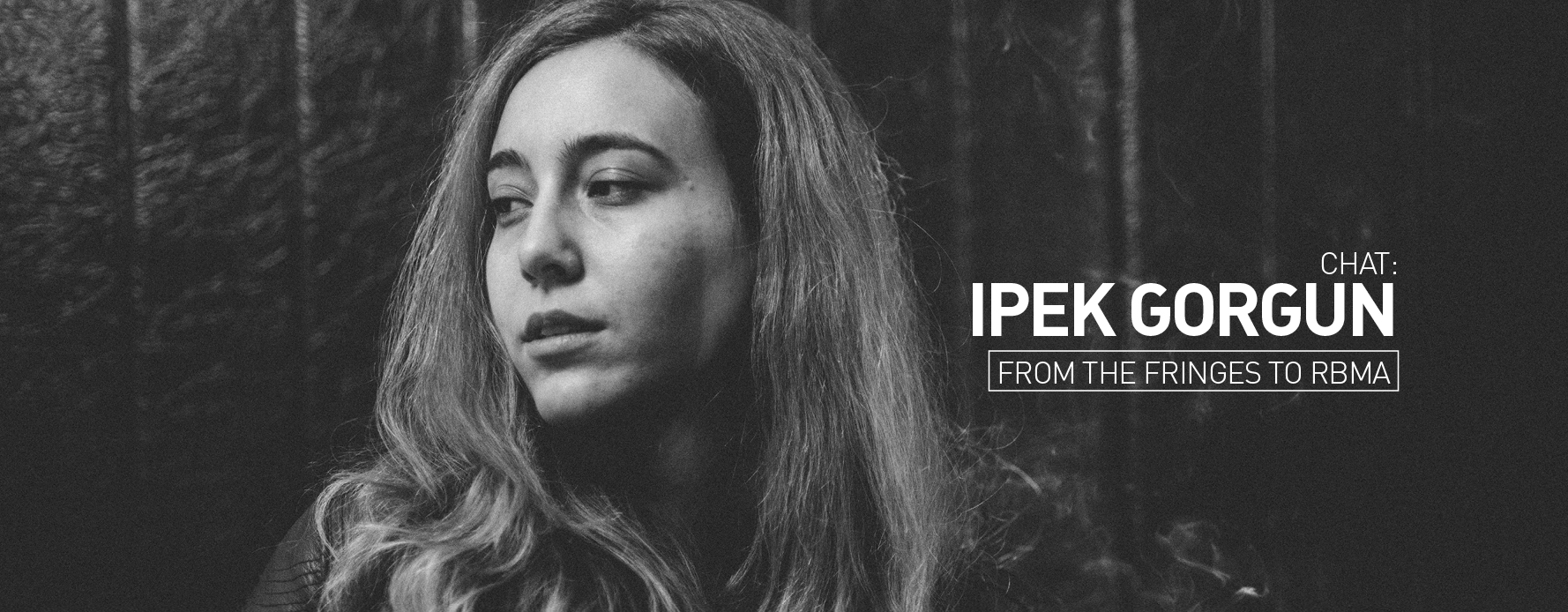Ipek Gorgun: Academic
 Thirsty for JUICE content? Quench your cravings on our Instagram, TikTok and WhatsApp
Thirsty for JUICE content? Quench your cravings on our Instagram, TikTok and WhatsApp

Coming from Turkey, noisician Ipek Gorgun is fittingly as erudite as the country’s pioneering electronic musicians from the ‘50s – educated and a student of the arts, as she is currently doing her Ph.D in Sonic Arts at ITU-MIAM (Istanbul Technical University-Center for Advanced Studies in Music). She is also one of the few Red Bull Music Academy participants of 2014 that belonged in the more off-kilter side of the electronic music canon. JUICE manages to steal a moment from her ciggie break during RBMA Tokyo for a quick education on Turkey’s underground music.
We’re absolutely clueless as to what the electronic scene is like in Turkey. Enlighten us.
Thankfully I’m not the only person doing it. Actually, I can say that there has been an underground scene since the ‘90s, but during that time it was more about trance and house music. There were small underground clubs in the capital city, Ankara, but then they all got closed somehow. With the arrival of the grunge era, people switched genres – they got more into punk rock, some people got into metal, because there was a whole vibe of hard rock and metal in Turkey during the ‘90s. After a while, everybody switched to that. Then by the time we got to the ‘00s, the clubs started to reopen and people started to listen… of course, the development of the internet in Turkey was a huge factor – people got more and more into electronic music through clubs at first. After a while, people like Osman Kaytazoglu and his friends, people from bands like Replikas, got more into working with sounds. And after that, it got to a strange place, after they got more into sounds and bringing compositional elements into it, they started using computers in their music – [the scene] got more and more into the experimental side of electronic music. Now, there’s a very nice scene. Those who were usually using guitars for noises and stuff, they started to get more fond of computers. It was a nice switch from metal, punk rock, noise rock to experimental electronic music. It wasn’t like a progression, but a switch. Great bands came out of Izmir, Ankara more in the vibe of experimental electronic stuff. With the development based in MIAM, in Istanbul Technical University, the centre of advanced music research, there were departments like sound engineering, sound technologies, and sonic arts – [with] the developments of these faculties, people and also the musicians in the university got more and more into electronic music. Especially with MIAM, where I came from, we got way deeper into electronic composition. We have so many artistes – noise artistes – it’s not like 100 or something, but we have a nice little scene. Also, just a historical thing, back in the ‘50s – you need to check it out – we had major electronic music pioneers Bülent Arel and İlhan Mimaroğlu. These guys went to Columbia-Princeton Electronic Music Centre and they worked with American electronic composers. They were decades and decades ahead of us! By the time we came to late ‘90s and mid-‘00s, we can see that people went back to their works – they were the pioneers, they were important people, not just for the Turkish people, but they have their own place in the development of electronic music composition all over the world. Their works are being revisited by our contemporaries now.
Wow, we had no idea Turkey’s history in electronic music goes way back. Have they always been well-known or only now that people are discovering their works?
They were always there. They were recognised, Turkish composers also recognised them. They became classical music. But our generation just needed to find them again.
Is your own history similar to the rest of your contemporaries? Did you only start making noise-slash-electronic music when you joined MIAM?
Oh, no. I was in this noise rock band called Bedroomdrunk. I played in this band for… 13 years or something. Since we were making experimental rock music, at some point we evidently experimented a lot so much with sound. Even before that journey, I grew up listening to a lot of old school industrial music like Throbbing Gristle, Cabaret Voltaire, and The Residents – and I got into punk music [as well] – while listening to those musicians and avant-garde rock, I realised there was something about sound that wasn’t used in the way the mainstream does. At that point, I started to dig deeper into what was this thing that interested me the most about that kind of music. Then I discovered that what intrigued me was the usage of sound and noise. Since we were experimenting in Bedroomdrunk, it just ended up like “Okay, this is definitely about noise and silence and everything revolving around it.” During that time, when I was digging deeper into my research, I started to develop my own understanding of sounds and found my own language, that’s when I started studying electronic music. It was a nice crossroad for me – I was just in the middle of this crossroad where I was starting to compose electronic music and getting into the history of it. After that, I started to work in MIAM as a Ph.D student.
You mentioned that it started with the dancier side of electronic music in trance and techno, then there was the experimental noise-electronic side to it later on. Those are two extremes, was there anything in the middle?
For the middleground, it was still experimental rock in Turkey. If you look at it and also psychedelic rock, you’d see another history coming up. We have people like Erkin Koray for example, through the ‘70s, there’s another history in that. That’s the middleground that was always there; huge experimentations with synthesisers, guitars, and everything came with him. The period between 1998 and 2007, there was a huge rise of experimental bands like Fungu, Dandadadan, and Replikas of course, these guys all brought their own language to this middleground. They all listened to avant-garde composers, by that I don’t mean just electronic musicians, but many of them were into free jazz, extreme metal, they put all that into their music, like Nekropsi for example, they were into that too. These bands were the middleground, but their music wasn’t dance-y in a trance vibe, but more rock’n’roll. Erkin Koray was a huge influence on many of us.
What about the mainstream side of Turkish music?
The story is a little different. That’s the point where big producers come in, and when there are big producers, there comes compromises and expectations and fulfilling cultural status quo for the era. For now, it’s like there are two sides of the Turkish mainstream – there are pop songs with electronic beats; there are also rock bands, but none of them are experimental, they are just combining Arab-esque influences with distorted guitars; there’s also another side that’s more alternative, not fully mainstream but getting a bit mainstream on the side of rock’n’roll, people writing fast pop rock songs with meaningless lyrics in a more Dadaist fashion. The mainstream is a little complicated in Turkey, you definitely need to go deeper if you want satisfactory music.
You are currently doing your Ph.D in sonic arts. We’re not sure what that entails, tell us a bit about it.
I’m learning a lot about audio programming and audio-signal processing – basically processing signals that are driven out of a medium; processing signals driven from anything like field recordings, acoustic sounds or digitally produced sounds, it doesn’t matter, just in a digital environment and make a musical structure out of it. Basically, electronic music composition and signal processing, but besides that, I learnt a lot about equipment and the usage of the equipment and what that refers to in our compositions with mixing, mastering, and all the advanced techniques. We’re also learning about the history of electronic music and music in general. Composers, musical histories, studies and researches on the theories and philosophies of sonic arts, and the theories are building up in technical and aesthetical terms. It’s a wide study.
No wonder you sound very academic. Personally, what are you conveying via your music?
I’m trying to breathe with music. Creating music for me is like a way of expression and breathing, a way to get into my own authentic place and trying to find how I relate to the world around me. It’s not just a way of expressing myself and how I conceive the world, but how I interact with the world too.


 Get Audio+
Get Audio+ Hot FM
Hot FM Kool 101
Kool 101 Eight FM
Eight FM Fly FM
Fly FM Molek FM
Molek FM